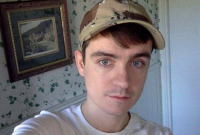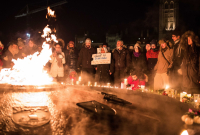Support strong Canadian climate journalism for 2025
There has been a lot of confusion surrounding calls in Canada's Parliament to denounce Islamophobia. Some critics are trying to mislead people about a formal motion on the issue in the House of Commons. They've been making it seem as though this motion was somehow part of an "Islamic" invasion of Canada.
And they've argued that the motion, proposed by Liberal MP Iqra Khalid, would criminalize anti-Islam sentiment and restrict freedom of speech.
“Islam should not be singled out and given more importance than other religions,” say the critics.
But the reality of the motion is quite different. Whether we single out Islam or not, Muslims are the ones being singled out in Canada.
By focusing on the Islamophobia part, critics have lost the inclusive spirit of the proposal, known in Ottawa as Motion-103.
Khalid's proposal simply calls for the multi-party Canadian heritage committee to study systemic racism and religious discrimination, including Islamophobia, in Canada, and to come up with recommendations on how to reduce it.
It is not only about Islamophobia, but this word was deliberately included by Khalid because of the elephant in the room — that the most devastating terrorist attack and only mass shooting at a place of worship in Canada was in a Mosque targeting Muslims.
This one community is being targeted
Given the alarming rise in attacks against Muslims, it appears that Muslims are being singled out. Hate crimes have decreased overall, yet hate crimes against the Muslim community have doubled. One in four Muslims reports having encountered difficulties crossing borders. And Muslim youth are the least optimistic about the next generation facing less discrimination than them.
Another telling sign is that individuals mistaken for Muslim have become victims too. As Khalid noted, “the Sikh and Christian Arab communities are targeted because people think they are Muslim.”
She made the comments on Feb. 27th at an event she hosted in her office. It was organized by the Toronto chapter of the Canadian Council of Muslim Women to discuss M-103 and dispel all of the myths surrounding the motion.
Khalid said that “the motion doesn't exclude other religions or community groups” but reinforced the uniquely vulnerable position of Muslims in Canada by highlighting the Quebec terrorist attack as a clear case of Islamophobic hate and, she warned, “this one community is being targeted.”
Many racist incidents aren't reported
There are daily occurrences of hate propaganda, verbal and physical violence, threats, vandalism, and online comments targeting Muslims but many incidents are not reported. I have been researching issues related to immigrant integration and discrimination for the last eight years and I've found that vulnerable populations, such as racialized groups, newer immigrants and refugees, are far less likely to even recognize, let alone report, a racist or hate incident.
For example, many immigrants who are not fluent in English or the "lingo" of Canadians, may not catch on to the racism that just occurred. Also, refugees who are fleeing from hostile situations and unstable governments often carry a "suspicion of authority", which plays a part in them not reporting a crime.
So, Khalid’s proposal to “collect data to contextualize hate crime reports and to conduct needs assessments for impacted communities” seems logical and pertinent. Ironically, the woman behind the motion who was criticized for singling out Muslims, has herself become the target of Islamophobic hate. She received 50,000 emails about the motion and said that many of them were direct hate and direct threats.
Defined as an irrational fear of Islam and a hatred or extreme dislike of Muslims, the term “Islamophobia” is at the heart of the debate on the motion in Parliament. Some have asked to replace the word with “anti-Muslim bigotry.” However, Khalid insists on not “watering down” her motion by replacing the term, claiming that it is this exact “irrational fear of Muslims” that has led some to discriminate against, demonize and dehumanize Muslims.
Khalid insisted “words have impact and this was a way of making a statement, acknowledging a problem…when I penned this motion back in December not even in my wildest imagination would I have thought that the Quebec terrorist attack would happen but it did, nor that I would be personally attacked because of this motion and the faith I belong to, but I was.” Khalid added that “I am calling on a better understanding of systemic racism and religious discrimination in Canada and I want Islamophobia to be part of that conversation”.
Prevailing misunderstandings about Islam feed the hate directed towards Muslims. The only way to dispel these myths is to learn more about Muslims and the diversity of the community. My research highlights the often contradictory and nuanced identities of Muslims. They are not a homogenous group.
A two-pronged approach must be taken to combat the rising climate of hate against Muslims in Canada. One that highlights the diversity of Muslims in Canada and another that requires the systematic analysis of the experiences of those Muslims who continue to be targets of religious discrimination. Motion-103 does not single out Muslims but it includes Muslims in a dialogue that often excludes their voices and experiences.






Comments